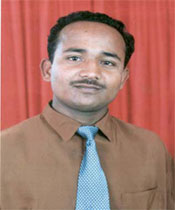Related Links
Case Updates
Krishna Adhikari
 On 6 June 2004, Krishna Prasad Adhikari, a resident of Fujel village of Gorkha District, was murdered in Chitwan District by Maoist cadres. Krishna Prasad was visiting his grandparents after having taken the SLC examinations, and he was abducted from Bakullahar Chowk by men who came on a motorcycle ...
On 6 June 2004, Krishna Prasad Adhikari, a resident of Fujel village of Gorkha District, was murdered in Chitwan District by Maoist cadres. Krishna Prasad was visiting his grandparents after having taken the SLC examinations, and he was abducted from Bakullahar Chowk by men who came on a motorcycle ... Maina Sunuwar
 Around 6 am on February 17, 2004, a group of RNA soldiers arrested Ms
Maina Sunuwar, a 15-year-old schoolgirl of Kharelthok VDC-6, Kavre
district. She disappeared since her arrest. Her family members, with
support from villagers and school where Maina was a student, visited
detention centers ...
Around 6 am on February 17, 2004, a group of RNA soldiers arrested Ms
Maina Sunuwar, a 15-year-old schoolgirl of Kharelthok VDC-6, Kavre
district. She disappeared since her arrest. Her family members, with
support from villagers and school where Maina was a student, visited
detention centers ... Sanjeev Kumar Karna
 Sanjeev Kumar Karna was one among the 11 persons arrested on October 8, 2003. On that fateful day, they had gone to attend a picnic program organized by the students at a place called Kariyachauri VDC-4, and from picnic, they went to Kataiya Chowri Area of Dhanusha district where they ate some food ...
Sanjeev Kumar Karna was one among the 11 persons arrested on October 8, 2003. On that fateful day, they had gone to attend a picnic program organized by the students at a place called Kariyachauri VDC-4, and from picnic, they went to Kataiya Chowri Area of Dhanusha district where they ate some food ... Arjun Bahadur Lama
Hari Prasad Bolakhe
Sarala Sapkota
Birendra Shah
Bishwanath Parajuli, Tom Nath Poudel and Dhan Bahadur Tamang
Chot Nath Ghimire and Shekhar Nath Ghimire
Bhauna Tharu
Discussion Programs on the Occasion of International Week of the Disappeared Held


The participants, including victims and stakeholders, voiced their apprehensions regarding the government's repetitive unfulfilled commitments and the prolonged postponement of the Transitional Justice process. They emphasized the adverse consequences resulting from such delays, particularly in terms of impeding the victims' ability to obtain truth, justice, and reparations.
Also, the participants from different organizations expressed their shared perspective that justice is the rightful entitlement of the victims, and the state must ensure its delivery. They emphasized the need to amend the transitional law in alignment with international legal standards and the rulings of the Supreme Court.
The victims voiced their shared experience, highlighting the distress and concern they experience due to societal and familial pressure to conduct funeral rites for their missing loved ones. In addition, the families are deprived of social security allowances, which further hindered their ability to sustain daily livelihood.
All the programs served as an informative platform for participants residing in rural communities, enabling them to stay updated on the current status of the transitional justice process. Additionally, these events proved beneficial in establishing a channel of communication with the local municipality, aiming to enhance access to reparations for the victims. Moreover, the attendees collectively resolved to exert pressure on both the federal and provincial governments to allocate budgets specifically for the reparation of the victims. Victims' participation at the event was substantial, encompassing a diverse range of individuals.
























Join Us